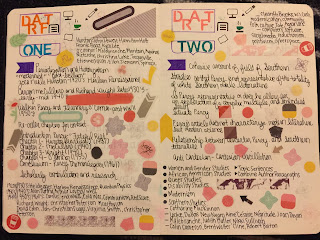I'm firmly lodged in my third "stall" phase of writing the dissertation. First I stalled on the proposal; then I passed the defense after 6 months of rescheduling. Next I stalled on Chapter 2; but I pushed through that (plus an introduction) this summer by going on a distant, week-long retreat. With four chapters and all revisions remaining after a full year of being ABD...I need a plan. One that doesn't involved driving 900 miles away from everything.
How can I recreate that distraction free, work-friendly environment I found so far away? I didn't hide in the woods to work like Thoreau or Nietzsche, even though I was bunking at a house in the idyllic Catskills. Every day I drove to the nearest tiny town to work at a bookstore with a coffee shop, where many locals sat at large tables with reading lamps, and worked on writing, telecommuting, or whatever they needed to do. It was THE THING to get me working. I am hoping I can recreate this atmosphere through local co-working.
There are a few options for co-working, depending on where you live and how much cash you can spare.
Co-Work Office Spaces:
It sounds funny to pay to work, but you can and should do just that if you can afford it. Co-working office spaces provide everything you need: wi-fi, coffee, water, desk space, printers, pens, and so on. All you need to bring is a laptop! Some of these spaces are more collegiate than others. People arrive at set times and keep each other accountable, and even have the water cooler banter you'd expect in the corporate world. Other spaces are more quiet and people keep to themselves.
 |
| 25N Coworking in Geneva, IL photo courtesy 25N Coworking |
Visit co-work spaces near you to check out the culture and environment before signing up. (I'm doing that this month.) This can start as low as about $100 per month, which is a pittance if it means your dissertation is getting written. (Note the passive voice there after my months of stalling... what I mean to say is you are writing your dissertation.) Many co-working spaces also offer higher cost plans that include perqs like assigned desks and lockers for your books.
The only caveat I anticipate about these spaces is that I might not fit in. Dissertation writing is a weird thing!
Public Library Work Spaces:
"Public" is the key word here. The public library is an excellent place to work that offers many of the conveniences and tools of the university library -- but it gets you away from the university! Working in THAT building, the school's library, can be just as distracting and psychologically disadvantageous as working from home. Changing it up by using a space that is still conducive to knowledge work, yet is less familiar and full of people doing different sorts of things, can help you work.
Treat it like an appointment! Some libraries have dedicated study rooms that you can reserve for a couple of hours at no cost. Make a date of reserving one on your thesis work days. You'll have access to everything you need, and you can even search for a library with a coffee shop attached or nearby. The only cost associated with this is the commute, and you'll have to bring everything with you every time.
I have used public libraries this way ever since I started grad school, because the university library had lost its draw for me by then. They are very comfortable and welcoming.
 |
| A public library's shared work space, Naperville, IL |
Meeting once a month may not sound like much, but scheduling and hosting a meet-up of busy people probably can't happen more often than that. Though, if you think about it -- meeting once a month for a few dedicated hours means tens of hours of writing over a year! You could use these to get through a chapter's worth of work, if not more.
Several of my colleagues host informal meet-ups in their homes or in seminar rooms on campus. They keep each other accountable and share an enormous task that they all understand (the latter, you can't get from a co-work space).
If you are a student or a local to NIU, this office hosts a monthly meet-up in the Founders Memorial Library called Write Place, Write Time, on the second Thursday of every month from 6-9pm. This group is ONLY for thesis and dissertation writers (or those writing proposals for such), so again, you are in good company if you attend. Having others working alongside you on the same kinds of tasks keeps you focused and activates that inner spectator who will tell you to "get back to work!"
 |
| The indispensable coffee bar at Inquiring Minds Bookstore (The bookstore that saved me! In Saugerties, NY) |
Good Luck!
If you are a person who has an awesome home-office situation that works for you, that is great. Or if you can work anywhere without feeling distracted, that's cool too! But for many of us, we need to remove ourselves from the dirty floors, dirty dishes, and hungry kids, or from the over-familiarity of the university office and library, in order to focus. I wish I could have brought that perfect bookstore home from the Catskills with me, but I couldn't. So I need to recreate a work space that uses the power of other people's work and the effects of a consistent but impersonal environment. I don't know how else to get things done. I hope you can find what works for your work too!































